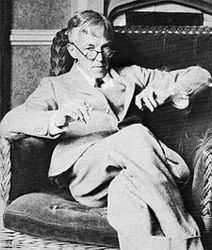Brief Biography and Reflection
Upon finishing A Mathematician's Apology by G.H. Hardy, I found the man and his attitude of the profession of mathematics to be notable. I recommend the book, and I plan to revisit the book again in a year or so.
Godfrey Harold 'G.H.' Hardy, born 7 Feb 1877, was an English Mathematician with significant contributions made to pure mathematics. Born between highly intelligent and wealthy parents, Hardy was "prodigiously clever", and unfortunately, he was aware of his brilliance well. Top of his class, sweeper of academic prizes, scholarships, Hardy went on to Winchester College to study mathematics, place he disliked except for the mathematical education he received. In tradition with eccentric character of many great mathematicians, he was socially awkward and shy and could not bear to look at himself at the mirror.
Despite his disinclination towards meeting new people, Hardy was an honest man and seems to communicate with brutal honesty. His most notable mathematical achievements were in collaboration with his colleagues, two notable being English Mathematician J.E. Littlewood and Indian Mathematician Srinivasa Ramanujan. When asked of his greatest achievement in the field of mathematics by Paul Erdős, he replied that it was the discovery of Srinivasa Ramanujan, who's display of brilliance awed Hardy and prompted him to bring Ramanujan to England to collaborate with him.
Hardy was a pure mathematician who wished that his work would never be applied, to be completely pure within the realm of mathematical world he believed existed independent of the physical world.
He would have loathed having been subject of biography by a non-mathematician who does cannot share his appreciation for mathematics and cannot understand his mathematical achievements. Therefore, I leave with his own line in justifying his life:
"I have never done anything 'useful'. No discovery of mine has made, or is likely to make, directly or indirectly, for good or ill, the least difference to the amenity of the world... The case for my life, then, or for that of nay one else who has been a mathematician in the same sense in which I have been on, is this: that I have added something to knowledge and helped others to add more; and that theses somethings have a value which differs in degree only, and not in kind, from that of the creations of the great mathematicians or of any of the other artists, great or small, who have left some kind of memorial behind them."


